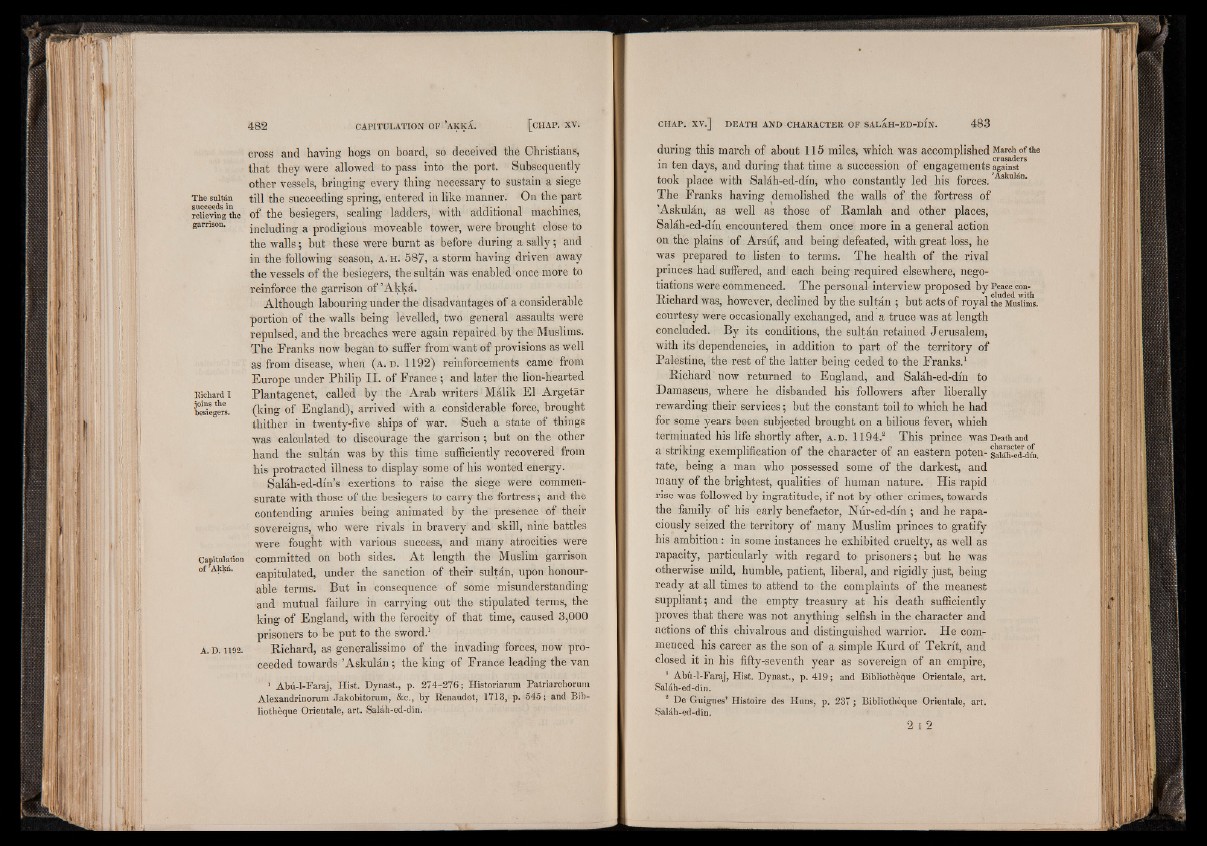
The saltón
succeeds in
relieving the
garrison.
Richard I
joins the
besiegers.
Capitulation
of ’Akká.
A. D. 1192.
cross and having hogs on board, so deceived the Christians,
that they were allowed to pass into the port. Subsequently
other vessels, bringing every thing necessary to sustain a siege
till the succeeding spring, entered in like manner. On the part
of the besiegers, scaling ladders, with additional machines,
including a prodigious moveable tower, were brought close to
the walls ; but these were burnt as before during a sally ; and
in the following season, a . h . 587, a storm having driven away
the vessels of the besiegers, the sultán was enabled once more to
reinforce the garrison of ’Akká.
Although labouring under the disadvantages of a considerable
portion of the walls being levelled, two general assaults were
repulsed, and the breaches were again repaired by the Muslims.
The Franks now began to suffer from want of provisions as well
as from disease, when ( a . d . 1192) reinforcements came from
Europe under Philip II. of France ; and later the lion-hearted
Plantagenet, called by the Arab writers Málik El Argetâr
(king of England), arrived with a considerable force, brought
thither in twenty-five ships of war. Such a state of things
was calculated to discourage the garrison ; but on the other
hand the sultán was by this time sufficiently recovered from
his protracted illness to display some of his wonted energy.
Saláh-ed-dín’s | exertions to raise the siege were commensurate
with those of the besiegers to carry the fortress ; and the
contending armies being animated by the presence of their
sovereigns, who were rivals in bravery and skill, nine battles
were fought with various success, and many atrocities were
committed on both sides. At length the Muslim garrison
capitulated, under the sanction of their sultán, upon honourable
terms. But in consequence of some misunderstanding
and mutual failure in carrying out the stipulated terms, the
king of England, with the ferocity of that time, caused 3,000
prisoners to be put to the sword.1
Richard, as generalissimo of the invading forces, now proceeded
towards ’Askulán; the king of France leading the van
1 Abú-1-Faraj, Hist. Dynast., p. 274-276; Historiarum Patriarchorum
Alexandrinorum Jakobitorum, &c., by Renaudot, 1713, p. 545; and Bibliothèque
Orientale, art. Saláh-ed-dín.
during this march of about 115 miles, which was a c c om p lish e d March of the
• i i * i * • n crusaders in ten days, and during that time a succession ot engagements against
took place with Saláh-ed-dín, who constantly led his forces. Askulán‘
The Franks having demolished the walls of the fortress of
'Askulán, as well as those of Ramlah and other places,
Saláh-ed-dín encountered them once more in a general action
on the plains of Arsiif, and being defeated, with great loss, he
was prepared to listen to terms. The health of the rival
princes had suffered, and each being required elsewhere, negotiations
were commenced. The personal interview proposed by Peace con-
Richard was, however, declined by the sultán ; but acts of royal the Muslims,
courtesy were occasionally exchanged, and a truce was at length
concluded. By its conditions, the sultán retained Jerusalem,
with its dependencies, in addition to part of the territory of
Palestine, the rest of the latter being ceded to the Franks.1
Richard now returned to England, and Saláh-ed-dín to
Damascus, where he disbanded his followers after liberally
rewarding their services ; but the constant toil to which he had
for some years been subjected brought on a bilious fever, which
terminated his life shortly after, a . d . 1194.2 This prince was Death and
a striking exemplification of the character of an eastern poten- sailh-ed-dm.
tate, being a man who possessed some of the darkest, and
many of the brightest, qualities of human nature. His rapid
rise was followed by ingratitude, if not by other crimes, towards
the family of his early benefactor, Nur-ed-din ; and he rapaciously
seized the territory of many Muslim princes to gratify
his ambition : in some instances he exhibited cruelty, as well as
rapacity, particularly with regard to prisoners; but he was
otherwise mild, humble, patient, liberal, and rigidly just, being
ready at all times to attend to the complaints of the meanest
suppliant; and the empty treasury at his death sufficiently
proves that there was not anything selfish in the character and
actions of this chivalrous and distinguished warrior. He commenced
his career as the son of a simple Kurd of Tekrit, and
closed it in his fifty-seventh year as sovereign of an empire,
1 Abû-1-Faraj, Hist. Dynast., p. 419 ; and Bibliothèque Orientale, art.
Saláh-ed-dín.
s De Guignes’ Histoire des Huns, p. 237 ; Bibliothèque Orientale, art.
Saláh-ed-dín.
2 i 2